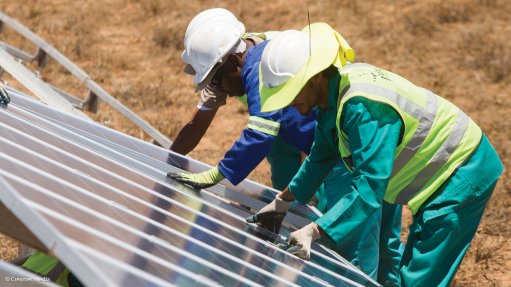A fresh approach to South Africa’s power challenge
This article has been supplied as a media statement and is not written by Creamer Media. It may be available only for a limited time on this website.
In March 2019, Eskom announced that it had been forced to implement Stage 6 load shedding. This amounted to as much as 6000MW of a total estimated installed capacity of 51 000 MW being unavailable to users, with more disruptions likely to come during the approaching winter. A combination of ageing power stations, unplanned maintenance, and design flaws in new power stations Medupi and Kusile, have forced the utility into implementing rolling power cuts to give itself enough space to make emergency repairs to the system.
Eskom is under huge financial strain, facing structural challenges, logistical issues, and a skills shortage that severely affects the company’s ability to detect system faults early enough to prevent further crises.
The ramifications of this supply instability go far beyond the inconvenience of missing a live football match or some meat spoiling in the freezer. Thousands of small businesses around the country are complaining that their already fragile businesses face ruin should electricity continue to be disrupted. Extended blackouts place citizens under increased security risk, as opportunistic criminals take advantage of congested traffic and compromised alarm systems.
Eskom’s issues will take some time to fix, but in the short-term, the Government will want to reassure South African consumers that it cannot only prevent a black out, but ensure security of supply for the long term.
In his February State of the Nation address, President Cyril Ramaphosa announced plans to unbundle the state power utility into three separate entities – generation, transmission and distribution.
This plan will undoubtedly bring much-needed improvements in efficiency, but the transformation of the industry can’t stop there. Unbundling is not the sole panacea to the country’s electricity woes, and South Africa’s power market needs thorough regulatory, technological and economic shift away from the current centralised system.
With thousands of kilometres of infrastructure sending electricity to customers across the country, the transmission network loses as much as 40% of generated power through thermal heating.
South Africa needs to move towards a decentralised model made up of localised generation-to-distribution nodes with shorter transmission lines. While power losses will still affect these nodes, these losses will be reduced significantly to as little as 15% of generated power.
A decentralised model is much more flexible and makes it easier to employ renewables in microgrids equipped with more cost-effective battery units, further alleviating the burden on the national grid during peak periods. Moreover, when a failure happens, its impact is isolated to a limited area and repairs are completed much faster. Securing microgrids is easier, as private operators are better equipped and incentivised to protect themselves against the threat of unsafe, illegal connections.
Localised grids have the dual benefits of easily reducing the cost of power by as much as half the current cost and easing the burden on the national grid. These benefits can only increase exponentially over time as cheaper and more efficient technologies are developed. The first African country to unbundle its power utility in 2001 was Uganda, followed by Nigeria 2010. These early examples offered many lessons, but most importantly that unbundling should not be the end of the story but must be accompanied by a well-structured regulatory framework that supports new competition and continued operational efficiency. Any regulatory body responsible for the sector needs to be strong enough to do the important job of opening the industry to new independent power producers, while creating innovative incentives for consumers to produce and store their own power and feed it back into the system if, and when needed.
Opening the power industry for diversification will not pose a threat to Eskom. In fact, it can only strengthen the utility’s role as the base load supplier, as it will offer the company the much-needed margin to conduct thorough maintenance and ensure that any new build programmes are conducted steadily and strategically, with the best interests of all South Africans at heart.
Comments
Press Office
Announcements
What's On
Subscribe to improve your user experience...
Option 1 (equivalent of R125 a month):
Receive a weekly copy of Creamer Media's Engineering News & Mining Weekly magazine
(print copy for those in South Africa and e-magazine for those outside of South Africa)
Receive daily email newsletters
Access to full search results
Access archive of magazine back copies
Access to Projects in Progress
Access to ONE Research Report of your choice in PDF format
Option 2 (equivalent of R375 a month):
All benefits from Option 1
PLUS
Access to Creamer Media's Research Channel Africa for ALL Research Reports, in PDF format, on various industrial and mining sectors
including Electricity; Water; Energy Transition; Hydrogen; Roads, Rail and Ports; Coal; Gold; Platinum; Battery Metals; etc.
Already a subscriber?
Forgotten your password?
Receive weekly copy of Creamer Media's Engineering News & Mining Weekly magazine (print copy for those in South Africa and e-magazine for those outside of South Africa)
➕
Recieve daily email newsletters
➕
Access to full search results
➕
Access archive of magazine back copies
➕
Access to Projects in Progress
➕
Access to ONE Research Report of your choice in PDF format
RESEARCH CHANNEL AFRICA
R4500 (equivalent of R375 a month)
SUBSCRIBEAll benefits from Option 1
➕
Access to Creamer Media's Research Channel Africa for ALL Research Reports on various industrial and mining sectors, in PDF format, including on:
Electricity
➕
Water
➕
Energy Transition
➕
Hydrogen
➕
Roads, Rail and Ports
➕
Coal
➕
Gold
➕
Platinum
➕
Battery Metals
➕
etc.
Receive all benefits from Option 1 or Option 2 delivered to numerous people at your company
➕
Multiple User names and Passwords for simultaneous log-ins
➕
Intranet integration access to all in your organisation


















